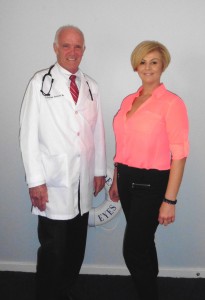Treatment of Acute Illness and Injuries
For example, upper respiratory or urinary tract infections and breaks, cuts, and lacerations.
Management of Chronic Illness
Including hypothyroidism, diabetes, asthma, high blood pressure, and high cholesterol.
Complete Medical Exam
For annual health reviews required by schools and employers and for required DMV license renewals.
Cancer Screening
We follow the U.S. Preventive Task Force recommendations for cancer screening (USPSTF).
Cancer screening recommendations for average-risk adults:
Breast self-examination
Recommends against teaching breast self-examination (D).
Clinical breast examination
Insufficient evidence to recommend for or against.
Mammography
Recommends biennial screening mammography for women aged 50-74 years (B). Decision to start biennial screening before age of 50 should be an individual one and take patient context into account, including the patient’s values regarding specific benefits and harms (C).
Cervical cancer screening
Recommends screening for cervical cancer in women aged 21-65 years with cytology (Pap smear) every 3 years, or for women aged 30-65 years who want to lengthen the screening interval, screening with a combination of cytology and human papillomavirous (HPV) testing every 5 years (A).
Recommends against screening for cervical cancer in women younger that 21 years (D).
Recommends against screening for cervical cancer in women older than 65 years who have had adequate prior screening and are not otherwise at high risk for cervical cancer (D).
Recommends against screening for cervical cancer in women who have had a hysterectomy with removal of the cervix and who do not have a history of high-grade precancerous lesion (ie, cervical intraepithelial neoplasia [CIN] grade 2 or 3) or cervical cancer (D).
Recommends against screening for cervical cancer with HPV testing, alone or in combination with cytology, in women younger than 30 years (D).
Colorectal cancer screening (CRC)
Recommends CRC screening using fecal occult blood testing (home test with three samples), sigmoldoscopy, or colonoscopy in adults beginning at age 50 years continuing until age 75 years (A).
Recommends against routine screening in adults aged 76-85 years (C).
Recommends against screening in adults older than added 85 years (D).
Prostate cancer screening
Recommends against PSA-based screening for prostate cancer (D).
Testicular cancer screening
Recommends against screening for testicular cancer in adolescent or adult males.
_____________________________________________________________
United States Preventive Services Task Force (USPSTF). Recommendations available at www.ahrq.gov
Recommendation A: The USPSTF strongly recommends that clinicians routinely provide to eligible patients. (The USPSTF found good evidence that the service improves important health outcomes and concludes that the benefits substantially outweigh harms.)
Recommendation B: The USPSTF recommends that clinicians routinely provide the service to eligible patients. (The USPSTF found at least fair evidence that the service improves health outcomes and concludes that the benefits substantially outweigh harms.)
Recommendation C: The USPSTF recommends against routinely providing the service. There may be considerations that support providing the service in an individual patient. There is at least moderate certainty that the net benefit is small.
Recommendation D: The USPSFT recommends against routinely providing the service to asymptomatic patients. (The USPSTF found at least fair evidence that the service is ineffective or that harms outweigh benefits.)
Stress Management
Holistic approach: Stresses associated with everyday life. Medications may be used but are not the cornerstone of treatment.
Slow Aging Process
For example, topical treatment of aging skin, diagnosis and treatment of decreased levels of estrogen or testosterone, education concerning proper diet, use of supplements, and appropriate exercise.
Weight Loss Management
A Combination of behavior modification, exercise, therapeutic medications (oral and/or injectable) and establishment of healthy eating patterns.
